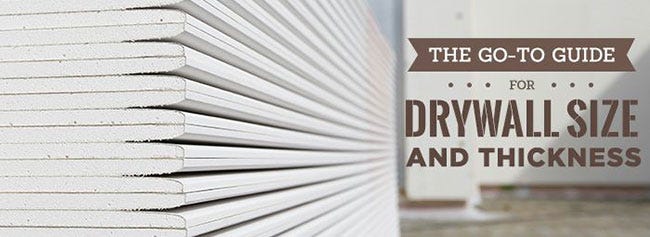Drywall Thickness
Choosing a sheet size. If the wall studs are placed 24 inches on center a 58 inch drywall is recommended.
Thickness Of Interior Walls Thickness Of Interior Walls Drywall
The differing thicknesses also offer differing levels of insulation and protection from sounds moisture and fire.

Drywall thickness. Drywall is relatively uncommon and can be used for repairs or for curved areas where you can double up two sheets to make a standard sheet. Cement board was originally intended for use as a tile backer board. The 05 inch 127 mm and 0625 inch 159 mm are the most common of the four.
Use the information below to learn the differences among drywall thickness options. Usually 12 or 58. Each thickness has its own unique application based on a variety of factors.
Drywall thickness usually moves from a quarter of an inch to 58 of an inch. The 3 x 5 size comes from the dimensions of a tub enclosure. Different thicknesses of drywall.
If you are installing drywall on a ceiling you will want to use half inch or even go up to 58 inch thick panels to prevent sagging. Weight per 4 x 8 sheet 81 lb availability this thickness and the sizes indicated are available at most home supply and drywall supply stores. While the most common size is 4 x 8 feet you can purchase much larger lengths.
In fact i cant see it being effective at anything let alone soundproofing unless youre layering it. Also is the standard thickness for fire resistant or fire code drywall commonly found in garages. That said drywall sheetrock gypsum wallboard etc being used for ceilings and walls for interior spaces is usually 12 inch thick.
When used on ceilings it is also sometimes glued up to help keep it from sagging over time. Drywall can be nailed or screwed to wood or metal studs. However drywall being used for walls which might be shared with an attached garage are usually 58 inch thick for added fire protection purposes.
Well if you have curved walls i suppose such a thin drywall would curve more easily. Drywall comes in various thicknesses 38 inch and 12 inch being the most common. Drywall comes in sheets.
58 inch sheets are the only thickness which is commonly available in a fire resistant form which has its own specialized applications. This will help you determine how much drywall you need for your project. Drywall can be found in several thicknesses.
Use a sheet size that minimizes the number of seams that will appear in the finished product. In my opinion using a quarter inch drywall would be really pushing it. This material is recommended for walls with studs placed 16 inches on center.
Even when drywall is properly installed with the requisite quantity of fasteners sagging can become a problem. The most common thickness of drywall used in residential interior construction is 12 inch. The sizing of your sheetrock is crucial to your project.
025 inch 635 mm 0375 inch 952 mm 05 inch 127 mm and 0625 inch 159 mm. Most prehung doors are designed to work with 12 inch drywall installed on each.
The Go To Guide For Drywall Size And Thickness Williams Brothers
Chart Drywall Thickness

0 Response to "Drywall Thickness"
Post a Comment